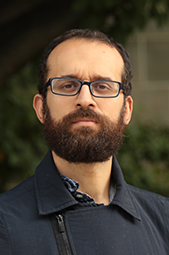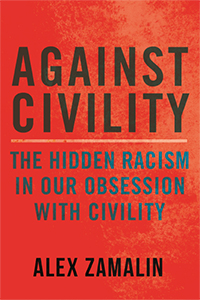‘Civility’ has a racist past, professor’s new book argues
 The word “civility” is frequently used in discussions on how to heal the deep political and personal divisions in this country. But a new book by Detroit Mercy Assistant Professor of Political Science Alex Zamalin argues that the word has been used historically to silence people working toward a more just society.
The word “civility” is frequently used in discussions on how to heal the deep political and personal divisions in this country. But a new book by Detroit Mercy Assistant Professor of Political Science Alex Zamalin argues that the word has been used historically to silence people working toward a more just society.
Zamalin has been on a whirlwind of national events promoting the book, Against Civility: The Hidden Racism in our Obsession with Civility, which seems to have arrived at the right time for this national discourse.
Zamalin, who chairs Detroit Mercy’s African American Studies program, said he started thinking about the word around the time of the mid-term elections in 2018 when people were hoping and calling for a return to civility.
“And I asked myself, does civility as a rallying cry work for social justice?” he said.
According to his research, the answer is no.
“From the beginning, you see how civility is a mask to hide racism,” he said.
That beginning, Zamalin says, was 1837, when South Carolina Sen. John C. Calhoun, on the floor of the U.S. Senate, blamed the national divisions over the issue of slavery on the incivility of Northern abolitionists.
“It is weaponizing the concept of civility because when you focus on civility, or the perception of incivility, you effectively shut down what they are trying to say,” Zamalin said.
The book draws its conclusions on more than 150 years of history in which people fighting for change were told to be polite and wait, change will come. The irony is that the civil actions undertaken were met with violence, often in the form of lynchings, from the very people who called for civility in the first place.
 Zamalin writes: “Civility hasn’t been the organizing principle of the most successful anti-racist thinkers and movements who have sought to dismantle U.S. racism. They discovered, over and over again, that real political change happens through direct struggle, without obligation to decorum or propriety. Creating real political change requires us to confront unequal institutions rather than simply point out bad behavior. … Disobeying unjust laws and taking disruptive action puts pressure on the levers of political, cultural, social, and economic power, and that pressure is what moves ruling elites to take notice and come to the negotiating table.”
Zamalin writes: “Civility hasn’t been the organizing principle of the most successful anti-racist thinkers and movements who have sought to dismantle U.S. racism. They discovered, over and over again, that real political change happens through direct struggle, without obligation to decorum or propriety. Creating real political change requires us to confront unequal institutions rather than simply point out bad behavior. … Disobeying unjust laws and taking disruptive action puts pressure on the levers of political, cultural, social, and economic power, and that pressure is what moves ruling elites to take notice and come to the negotiating table.”
He notes that Martin Luther King, Jr. said that his greatest enemy was not the Ku Klux Klan, but white moderates using civility as a way to ignore the call for change.
What works best for change? Something Zamalin calls civic radicalism, which has been used to drive change from Frederick Douglass to W.E.B. Du Bois to Ida B. Wells to James Baldwin to the Black Lives Matter protesters. He writes: “A politics based in civility makes agreement among participants the prerequisite for political thought, whereas civic radicalism begins with the goal of liberation for all, regardless of who disagrees.”
What Zamalin said he hoped to do with this book, his fifth on the subject of race relations, though his first written for a more general audience, is to encourage people to look differently at calls for civility, to look at how the word “civil” has been used to problematize calls for change and to understand that that it has been used for more than a century to keep the status quo and shut down movements toward social justice.
Against Civility: The Hidden Racism in our Obsession with Civility is available anywhere books are sold.
— By Ron Bernas. Follow Detroit Mercy on Facebook, Twitter and Instagram. Have a story idea? Let us know by submitting your idea.
